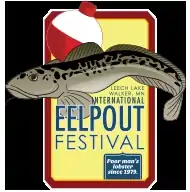Eelpout Festival
The International Eelpout Festival is an annual gathering held in the town of Walker, Minnesota. It celebrates the eelpout (or burbot, scientific name Lota lota), an indigenous bottom dwelling fish that inhabits the region's lakes, in some cases being found as deep as 300m. The fish itself is described as a cross between a catfish and eel, giving it a slender disposition but retaining a tapered midsection with a full complement of pectoral and caudal fins. While Lota lota is known locally as eelpout, eelpout also may refer to a family of marine fishes. Leech Lake is known for its exceptional walleye fishing, making this festival a banner for the often forgotten eelpout.[1][2]
| Eelpout Festival | |
|---|---|
 Official Logo of the Eelpout Festival | |
| Genre | Festival |
| Dates | February 2021 |
| Location(s) | Walker, Minnesota |
| Years active | 1979–2019, 2021– |
| Attendance | 11,000 (2012) |
| Website | http://www.eelpoutfestival.com/ |
2018 location move
As reported in September 2017 for a variety of reasons, the festival board is exploring the possibility of relocating the event to Lake Bemidji, an hour northwest of Walker. According to the Bemidji Pioneer, an application has been filed with the Beltrami County board, to proceed with moving the event north.
History
The first Eelpout Festival was held in February 1979 and ran continuously to 2019. Because of pollution concerns, 2020 saw the festival get scrapped. The celebration is held during one of the coldest periods of the year, and temperatures often reach well below zero.[3]
The events are designed to cater to a wide range of audiences and family activities are plentiful.[1]
Environment
Leech Lake is well known among locals for its abundance of walleye, bass, Northern pike, sunfish and muskellunge. Eelpout are frequently caught only during the winter months. Leech Lake is the third largest lake in Minnesota covering 102,947.83 acres, with 195 miles of shoreline, and a maximum depth of 150 feet. Temperatures in February average a high of 25 degrees Fahrenheit and a low of 5 degrees.[3]